高中英语2014届高考英语(人教版)复习教学案:必修5 Unit 4 Makingthenews教案
- 格式:doc
- 大小:95.01 KB
- 文档页数:7
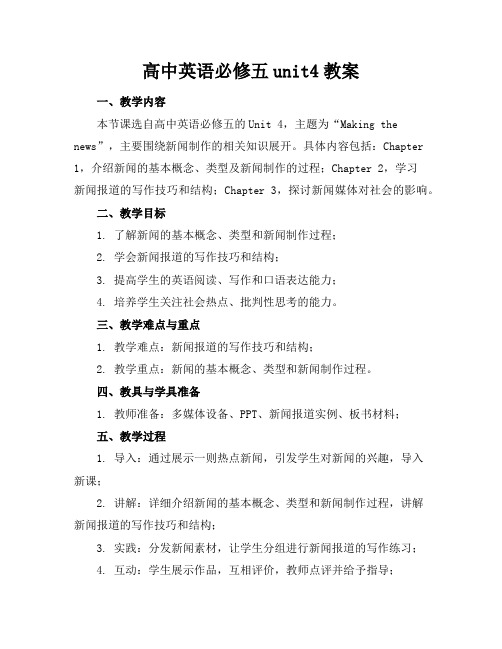
高中英语必修五unit4教案一、教学内容本节课选自高中英语必修五的Unit 4,主题为“Making the news”,主要围绕新闻制作的相关知识展开。
具体内容包括:Chapter 1,介绍新闻的基本概念、类型及新闻制作的过程;Chapter 2,学习新闻报道的写作技巧和结构;Chapter 3,探讨新闻媒体对社会的影响。
二、教学目标1. 了解新闻的基本概念、类型和新闻制作过程;2. 学会新闻报道的写作技巧和结构;3. 提高学生的英语阅读、写作和口语表达能力;4. 培养学生关注社会热点、批判性思考的能力。
三、教学难点与重点1. 教学难点:新闻报道的写作技巧和结构;2. 教学重点:新闻的基本概念、类型和新闻制作过程。
四、教具与学具准备1. 教师准备:多媒体设备、PPT、新闻报道实例、板书材料;五、教学过程1. 导入:通过展示一则热点新闻,引发学生对新闻的兴趣,导入新课;2. 讲解:详细介绍新闻的基本概念、类型和新闻制作过程,讲解新闻报道的写作技巧和结构;3. 实践:分发新闻素材,让学生分组进行新闻报道的写作练习;4. 互动:学生展示作品,互相评价,教师点评并给予指导;6. 课后作业布置:布置相关作业,巩固所学知识。
六、板书设计1. 新闻基本概念、类型;2. 新闻制作过程;3. 新闻报道写作技巧和结构;4. 课堂练习及答案。
七、作业设计1. 作业题目:请以“校园新闻”为主题,写一篇新闻报道;八、课后反思及拓展延伸1. 反思:本节课教学过程中,关注学生的学习反馈,针对学生掌握不牢固的部分进行巩固;2. 拓展延伸:鼓励学生关注国内外热点新闻,提高英语阅读水平,学会用英语表达自己的观点。
同时,组织学生进行新闻讨论,培养批判性思维。
在教学过程中,注重实践情景引入,例题讲解和随堂练习,使学生在实际操作中掌握知识,提高能力。
通过严谨的用词和流畅的段落衔接,确保教学效果。
重点和难点解析1. 教学难点与重点的明确;2. 教学过程中的实践情景引入;3. 作业设计及课后反思与拓展延伸。

必修五Unit4教案设计一、教学内容本课教学内容为人教版高中英语必修五Unit 4 Making Plans。
本节课主要讨论未来的职业规划,通过听、说、读、写等多种方式提高学生的语言运用能力。
本节课包括三个部分:热身活动、主体活动和复习。
1. 热身活动:谈论未来的计划和梦想。
2. 主体活动:学习如何制定未来的职业规划,并通过任务型活动进行实践。
3. 复习:复习本单元的重点词汇和句型。
二、教学目标1. 学生能够掌握并运用本节课的重点词汇和句型,如“make a plan for”,“What do you think you’ll be doing in five years’ time?”等。
2. 学生能够听懂、会说、会读、会写关于未来职业规划的短文。
3. 学生能够提高自己的合作能力和交际能力。
三、教学难点与重点重点:本节课的重点是让学生能够运用所学的词汇和句型进行有效的交流,讨论未来的职业规划。
难点:如何引导学生正确使用情态动词进行未来的预测,如“I think you’ll be”,“I hope you’ll be”等。
四、教具与学具准备教具:多媒体课件、录音机、磁带。
学具:课本、练习册、铅笔、橡皮。
五、教学过程1. 热身活动(5分钟)教师提问学生关于未来的计划和梦想,引导学生进行自由的交流,如:“What do you want to be when you grow up?”,“What are your plans for the future?”等。
2. 主体活动(20分钟)(1)教师引导学生学习本节课的重点词汇和句型,如“make a plan for”,“What do you think you’ll be doing in five years’ time?”等。
(2)学生进行小组活动,根据所学的词汇和句型,制定一个关于未来职业规划的短文。
(3)教师选取几个小组的短文进行展示,并让学生进行评价和修改。
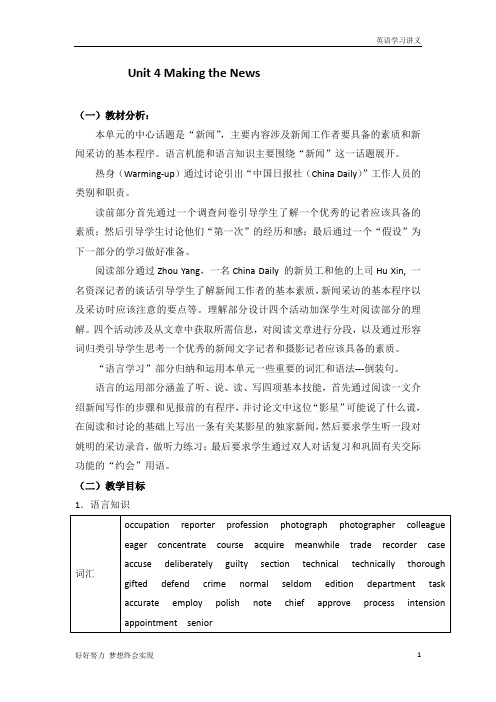
Unit 4 Making the News(一)教材分析:本单元的中心话题是“新闻”,主要内容涉及新闻工作者要具备的素质和新闻采访的基本程序。
语言机能和语言知识主要围绕“新闻”这一话题展开。
热身(Warming-up)通过讨论引出“中国日报社(China Daily)”工作人员的类别和职责。
读前部分首先通过一个调查问卷引导学生了解一个优秀的记者应该具备的素质;然后引导学生讨论他们“第一次”的经历和感;最后通过一个“假设”为下一部分的学习做好准备。
阅读部分通过Zhou Yang,一名China Daily 的新员工和他的上司Hu Xin, 一名资深记者的谈话引导学生了解新闻工作者的基本素质,新闻采访的基本程序以及采访时应该注意的要点等。
理解部分设计四个活动加深学生对阅读部分的理解。
四个活动涉及从文章中获取所需信息,对阅读文章进行分段,以及通过形容词归类引导学生思考一个优秀的新闻文字记者和摄影记者应该具备的素质。
“语言学习”部分归纳和运用本单元一些重要的词汇和语法---倒装句。
语言的运用部分涵盖了听、说、读、写四项基本技能,首先通过阅读一文介绍新闻写作的步骤和见报前的有程序,并讨论文中这位“影星”可能说了什么谎,在阅读和讨论的基础上写出一条有关某影星的独家新闻,然后要求学生听一段对姚明的采访录音,做听力练习;最后要求学生通过双人对话复习和巩固有关交际功能的“约会”用语。
(二)教学目标1.语言知识2.语言技能3.学习策略4.教学的重点和难点(1)重点1)了解新闻工作者的基本素质,新闻采访的基本程序以及采访时应该注意的要点等2)学会约会3)语法项目---倒装句4)了解新闻写作的步骤和见报前的有程序5)让学生初步学会运用所学的新闻报导的知识进行新闻文章写作(2)难点1)让学生归纳出新闻工作者的基本素质2)让学生灵活运用功能用语进行约会场景交流3)让学生初步学会写新闻报道文章(三)教学安排对课本内容进行优化组合,可将本单元分成6个课时Period 1 ReadingⅠ. Teaching aims:1. Target languageoccupation, do research, on one’s own, cover, concentrate on, acquire, accuse…of, so as to, scoop1)Not till you are more experienced!2)You’ll find your colleagues very eager to assist you and if you are interested in photography,it may be possible for you to concentrate on that later on.3)Not o nly am I interested in photography, but I took a course at university, so it’s actually ofspecial interest to me.4)Only if you ask many questions will you acquire all the information you need to know.5)We say a good reporter must have a “nose” for a story.6)This is a trick of the trade.7)Have you ever had a case where somebody accused your reporters of getting the wrongend of the stick?8)Perhaps I too will get a scoop!2. Ability goal1)Enable the students to talk about qualities needed to be a good reporter and howto conduct a good interview2)Train the students’ reading ability(skimming, detail reading)Ⅱ. Teaching important points:Help the students learn about the qualities need to be a good reporter, how to get an accurate story and how to protect a story form accusation.Ⅲ. Teaching difficult points:How to help the students learn about the qualities need to be a good reporter, how to get an accurate story and how to protect a story form accusation.Ⅳ. Teaching methods:Cooperative learning, task-based learning, fast-readingⅤ. Teaching aids:A computer, a blackboard, a tape-recordⅥ. Teaching procedures:StepⅠLead-in1.Greeting2.Ask Ss some questions about their future jobs.1)Have you ever considered about your future job or occupation?2)What kind of occupation would you like to take? / What’s your ideal of job infuture? Why?Step Ⅱ Warming-up1.Ask Ss to look at newspapers previously prepared and guess what kind of jobswould be needed to produce newspaper articles.2.Ask Ss to work in pairs and fill in the chart ( types of jobs, what each type of jobinvolves)Reference Chart:StepⅢ Pre-reading1.Ask the Ss work in pairs to discuss the qualities need for a newspaperreporter and evaluate which qualities they consider are the most important, and they can also make some complements. Put all the qualities on the board in a list and alongside them put two columns: one for the most important ones and one for important qualities. Ask one from each pair to give their findings on (what they consider) very important and important qualities. Put a tick for each one in the correct column. Count up the ticks and write down the three most important qualities and the three important qualities.2.Ask the Ss to work in pairs to discuss an occasion of this sort that they remembere.g. fist day at a new school, and ask them to consider why they remember it andespecially how they felt. Then choose some of them to tell their experiences.3.Discuss what all the experiences have in common and what they can do●Make themselves feel better●Make others feel betterStep Ⅳ Reading1.Fast reading. Ask the Ss to go through the whole passage as fastas they can and try to find answers to the following questions.(Shown on the blackboard)1)Could Zhou Yang go out on a story alone immediately? Why (not)?2)What mistakes must he avoid?3)How did Zhou Yang feel on his first day at work?2.Ask the Ss to pay attention to the way the questions develop in the dialogue(Explain to them that all of these questions are finding out more about the qualities and skills needed for the job)3.Ask the Ss to follow the tape and read the passage again and then do theExercise in comprehending part together. (For detail, refer to the PPT)Step Ⅴ Language pointsExplain some difficult language points as listed in the PPT. (Omitted, just refer to the correspondent PPT)Step Ⅵ Homework1. Practice reading aloud the dialogue with your partner. Pay attention to theintonation and stress.2. Read a newspaper and try to discover something to do with our topic about it.Period 2 Learning about LanguageⅠ. Teaching aims:1.Target Languageuntrained, fairly, technical, process, polish, concentrate on…; accuse …of …, approve of…, by accident, get absorbed in, defend against, break downShe does not get absorbed in…The reporter went out with…2.Ability goalsEnable the Ss to know how to use some expressions in an idiomatic way.Enable the Ss to use the words and expressions more freelyⅡ. Teaching important points:Get the Ss to practice the words and expressions more freely and correctlyⅢ. Teaching difficult points:How to enable the Ss to use the words and expressions more freely and correctlyⅣ. Teaching methods:Cooperative learning, task-based learning, explaining, discussion and practicing.Ⅴ. Teaching aids:A computer, a blackboard, a tape-recordedⅥ. Teaching procedures:StepⅠ GreetingsStepⅡ RevisionT: Yesterday we talked about the qualities needed to be a good reporter, how to get an accurate story and how to protect a story from accusation. Now I’d like you to tell me what qualities a reporter should have. (Ask a Ss to share their knowledge with others)StepⅢ Discovering useful words and expressions1.Ex1 on page 28. Give Ss directions that they should find the idiomatic expressionsused in the text to match with the expressions given in the Activity. Then check and make some necessary explanation.2.Ex2 on page 28. Ask the Ss to finish Exercise 2 and then check the answer andmake some explanation if needed.StepⅣ Using words and expressions (P63)1. First deal with Ex.1 on page 63.“What happened when the General went to war?” Students can work in pairs to have a discussion, and then ask some students to give their answers.A: The General went away to war. Meanwhile his advisers marked his progress on a map so as to be sure of knowing where he was.B: Meanwhile the gardener planted new flowers in the flowerbeds so as to be able to make a beautiful garden f or the General’s return.Meanwhile the cook learned to make some new dishes so as to be able to prepare a special banquet when the General returned.Meanwhile his wife made him some new clothes so as to be able to dress him smartly for the banquet on his return.Meanwhile his children practiced some new songs and dances so as to be able to perform for the General when he returned.2. If time permits, continue Exercises 2-4.Step V. Homework1.Review the words and expressions for this Unit.2.Preview discovering useful structures.Period 3 Grammar: InversionsⅠ. Teaching aims:1.Enable the students to use inverted sentences correctly2.Help the students learn how to use Inversions correctlyⅡ. Teaching important points:Help the students learn what Inversion is and how to use Inversions correctly Ⅲ. Teaching difficult points:How to help the students to apply the Inversions correctly in contextⅣ. Teaching methods:Inductive and deductive methods, task-based learning and cooperative learning Ⅴ. Teaching aids:A computer, a projectorⅥ. Teaching procedures:Step Ⅰ Presentation1.Ask the Ss to find out the sentences of Inversion in the Reading. First explainwhat an inversion is.“In normal word order in a sentence the subject comes before the verb. But sometimes the order of the subject and the verb is reversed, which we call Inversion.2.Ask the Ss to say the sentences, and then show the answers on the screen.Never will Zhou Yang forget his first assignment at China daily.Only when you have seen what he or she does, can you cover a story by yourself.Only if you ask many different questions will you acquire the information you need to knowStep Ⅱ Explanation and SummaryThe order of the subject and the verb is reversed after the following adverbial elements:1)Adverbial expressions of negation or near negation with no, not, never,neither, seldom, scarcely, rarely, barely and hardly, etc. The same reversal of word order takes place after negative conjunctions like neither, nor, not only…but also, no sooner… thane.g. In no case can an exception be made.Never have I seen such a stupid.Not until he loses all his money will he stop gambling.Scarcely had he entered the room when he was knocked down by astranger.Not only is he beautiful, but she is also very intelligent.I cannot attend the meeting tonight, and neither can my wife.2) Adverbial expressions with onlye.g. Only after an operation will he be able to walk again.Only one has he done such a thing.3) Adverbial expressions with soe.g. So greatly did he admire the beautiful actress he asked her to marry him.The word order is also reversed after the conjunction so.e.g. I caught a cold, and so did my wife.4) Adverbial expressions of placee.g. There stood the tallest man he had ever seen.Inside the room were a few pieces of furniture.But when the subject is a pronoun instead of a noun, the order should not be inverted.e.g. Here he comes.Off he ran.5) Other adverbials in initial positione.g. Loud and clear rang the bell.Often did we sit together without saying a word.Step Ⅳ Further Explaining全部倒装1.用于there be 句型.There are many students in the classroom2. 用于“here (there, now, then) + 不及物动词+主语的句型中,或以out, in, up, down, away等副词开头的句子里面,表示强调.●Here comes the bus.●There goes the bell.●Now comes our turn.●Out went the children.代词作主语时,主谓语序不变.Here it is.In he comes.3. 当句首状语是表示地点的介词词组时,也常引起全部倒装.South of the city lies a big steel factory.From the valley came a frightening sound.Under the tree stands a little boy.4. 表语置于句首时,倒装结构采用“表语+连系动词+主语”的结构1) 形容词+连系动词+主语Present at the meeting were Professor White, Professor Smith and manyother guests.2) 过去分词+连系动词+主语Gone are the days when they could do what they liked .4)介词+连系动词+主语Among the goods are Christmas trees, flowers, candles and toys.5. 为了保持句子结构平衡,或为了强调表语或状语,或为了使上下文结构紧凑.They arrived at a farmhouse, in front of which sat a small boy.Inside the pyramids are the burial rooms for the kings and queens and longpassages to these rooms.部分倒装1.用于疑问句.Do you speak English?2. 用于省略if 的虚拟条件句Had you reviewed your lessons, you might have passed the examination.3. 用于“形容词(或名词、动词)+as (though)”引导的让步状语从句.●Pretty as she is, she in not clever.●Try as he would, he might fail again.●Money as they had, they don’t know how to spend it.4. 用于no sooner than, hardly when 和not until的句型中No sooner had she gone out than the class began.Not until the teacher came did he finish his homework.5. 用于never, hardly, seldom, scarcely, little, atno time, not only 等否定词开头的句子里.●Never shall I do this again.●At no time can you say “ no” to the order.●Little do I dream I would see you here.6. 用于only 开头的句子(only位于句首,修饰副词、介词短语或状语从句)●Only in this way can you lean English well.●Only when he told me did I realize whattrouble he was in.7. 用于so, nor, neither 开头的句子,表示重复的内容.此句谓语应与前句谓语的时态形式一致.●He has been to Beijing. So have I.●Jack can not answer the question. Neither can I.8. 在so / such that 的结构中,若so 置于句首,则句子部分倒装●So difficult a problem is it that I can’t work it out.●Such a noble person is he that people all respect him.9.如果直接引语后注明引语是什么人所说的,主语是名词时,用倒装结构.主语是代词时,一般不用倒装结构.“Let’ go,” said the man / he said.10.用于某些祝愿的句子.May you succeed!Step Ⅴ Consolidating and Applying the ruleExercise to be shown on the PPT and one student at a time to do the exercise orally. (Multiple choices, E-C translation, using inversions)Step Ⅵ Summary and Assignment1.Make a summary of today’s task.2.Ask Ss to write a short passage, and try to use as many asinversions in the passage.Period 4 Using languageⅠ. Teaching aims:Target language:edition, department, accurate, concise, chief, employ, polish, note, chief, approve, negative, process, primary source, secondary source, present, investigateAlthough he realized…, Zhou Yang knew he must not accuse him directlyMonths of training had taught him to write with no wasted words or phrases.One of the reasons… that is that they help us to decide what is… and what is…Ability goals:1.Enable the Ss to get some basic knowledge about the writing and printingprocess of an article2.Enable the Ss know what is primary source and what is secondary source. Ⅱ. Teaching important points:Make Ss understand writing and printing process for an article and the primary and secondary sourceⅢ. Teaching difficult points:Make Ss understand writing and printing process for an article and the primary and secondary sourceⅣ. Teaching methods:Fast-reading method, task-based methodⅤ. Teaching aids:A computer, a blackboard, a recorderⅥ. Teaching procedures:StepⅠLead-in1.Greetings.2.“Nowadays with the develop ment of media, lots of information can bereceived by people all over the world soon everyday. And people can learnabout news at home and abroad by watching TV, listening to radio, surfingthe Internet, reading magazines and newspapers etc. Among these media,newspaper is one of the oldest, In China there are many kinds ofnewspapers. I believe all of you read some of them everyday. Am I right?”Using words above to lead in today’s topic and get Ss involved in their familiar media form, newspapers.StepⅡ Reading1.Ask Ss to go over the passage (Getting the “Scoop”) quickly and find thegeneral idea of the text. (Answer: It introduces the process of writing andprinting for a newspaper article.2.Scanning: Ask Ss to read the passage again and try to answer the questionsas listed on the screen.Questions:1)What is Zhou Yang’s first task? (Answer: His first task was to write hisstory)2)How many people read his article before it was ready to be processedinto film negatives? Who were they? (Answer: Before it was ready tobe processed into film negative, an editor from his department, thecopy-editor, the native speaker, the chief editor and the new desk editorread his article.)3.Then let the Ss make full use of their imagination to complete Ex2.Step Ⅲ Extensive Reading (P 65)1. Ask Ss to turn to page65 and read the passage as quickly as theycan to get the main idea of the passage. (Answer: The passage tells us what a primary source and a secondary source are and the difference between them.2. Ask Ss to read the whole text again in detail and do the True orFalse questions on blackboard.1. When we read about Jia Sixie in our textbook we are reading a primarysource.2. As we watch the news on TV, the person presenting the programme in thestudio is the secondary source.3. Photographers sometimes are both primary and secondary sources.4. Knowing the difference of primary and secondary sources can help us decidewhat is a fact and what is an opinion.5. Often facts and opinions are mixed in any report.Keys: FTFTTTipsA primary source depends on: The person who has written the news should bethere at the time.Primary sources and secondary sources are very important for finding out the truth. The closer a person is to the event they describe in time or geographically, the more likely they are to be accurate.3. Do Exercise3 to choose Ss’ understanding.The primary source is the Garlic Wars because it was written at the time. I think Plutarch Life of Julius Caesar and Shakespeare’s play about Julius Caesar will have more opinion than fact because they were written long after the events happened.Ste pⅣSummary and AssignmentToday we’ve learned writing and printing process for an aticle and what is a primary source and what is a secondary one. These are very important for your future work if you want to be a reporter. Today’s homework:1. Ask the students to interview a student of Senior Grade three and write areport about their present study and life.2. Report a thing recently happened in your neighborhood or in the local area.Period 5 Listening and SpeakingⅠ. Teaching aims:Target Language:remind … of…, appear, eyewitness, on the spot, supporter, photographShall we make an appointment?Maybe we can meet at…When do you think is convenient for you?Which day would suit you best?Where would you like to meet?I shall be busy at… and… , but I can be free at…I suggest that we meet…I may be able to see you at…That will/won’t be convenient because…I look forward to seeing you.Ability goal:1. Enable the Ss to learn how to make appointments2. Train Ss’ language skills listening & SpeakingⅡ. Teaching important points:Guide the Ss learn how to make appointments.Ⅲ. Teaching difficult points:How to guide the Ss learn to make appointmentsⅣ. Teaching methods:Listening; speaking, cooperative learningⅤ. Teaching aids:A computer, a projector and a tape recorderⅥ. Teaching procedures:StepⅠLead-inAsk a group of students to tell whom they want to interview most if they are offered a chance, and also ask them to make out the reason. Thus to lead in today’s task.T: If you were a reporter, who would you want to interview most? Why?StepⅡ ListeningTask1 Deal with the listening part on page 31.Ask Ss to go through the questions of Exercise 1&2 in Listening and Speaking on page31. Then play the tape for three times. (For the first time, ask them to listen for the main ideas and do Exercise 1, For the second time, finish Exercise 2. And for the last time, check the answers themselves.A.This is about a young man who is refused an interview with Liu May.B.This about a young man who is trying to arrange an interview with Liu Mei.C.This is about a young man who wants to ask Liu Mei about how to workabroad.1. Why does Zhou Yang want to interview Liu Ming?He wants to interview him about his decision to go to work abroad.2. What are his fans worried about?His fans worried that they will not see him in the flesh.Task2 Deal with Listening on page62 and listening task on page66.Step Ⅲ SpeakingThis task is to let the students practice making appointments.Ask Ss read instructions of Exercise 3 on page 32 and work in pairs and role-play theSample dialogue:S1: Hello. I’d like to speak to Li Feizhou. I’m the photographer ringing him to make an appointment for some photographs for “cool scene” magazine. Is it possible to meet him tomorrow?S2: Hello. Perhaps I can help. I am Li Feizhou’s secretary. I’m afraid he can only meet you tomorrow afternoon as he had a haircut in the morning. Is that OK?S1: Oh dear. I was hoping he would be free in the morning as I have another appointment then. It should only take two hours. Maybe we could meet before or after his appointment.S2: Yes. That might be possible. But he’s busy between 9:00 and 10:30 and then between 11:30 and 1:00 but he might be free for an hour between 10:30 and 11:30. S1: I don’t think that’s long enough. Could he change his other appointment to another day?S2: I don’t think so.S1: Then could he be free at 10:00? We could do the photographs and I would still be on time for my next appointment.S2: That sounds quite possible. I’ll ask him. What would he need to wear?S1: Some comfortable clothes would be best.S2: Fine. I’ll talk to him and call you again very soon. Where would i t be best to meet? S1: At the studio if that is OK with you. Thank you very much.S2: My pleasure.Step Ⅳ Listening (WB P62)The students will hear a conversation between Susan and Greg. They are asked to do the exercise according to the tape.T: Many people think that making a radio or TV interview is fun and interesting. But there can be problems. What will be problems? Listen to the tape and try to finish the exercise.Listen to the tape again and check the answers with the whole class.Students answer the questions in pairs. One asks the questions and the otherStepⅤ Listening Task (WB P66)Put students into pairs. Ask them to think of as many practical situations as they can, where being “on the spot” is very important to understanding what is happening. Discuss why an eyewitness would help in each situation.Listen to the tape for the first time. Ask students to write down the gist of the listening passage in one sentence.Go through the task and listen again and do the exercise.Check the answers.Step Ⅵ Summary and HomeworkIn this period we’ve done some listening practice and practiced how to make appointments. After class, please listen to the recording repeatedly and pay attention to the pronunciation as well as functional sentences of how to make appointments.Period 6 WritingⅠ. Teaching aims:Target languageeyewitness, opinion, information, stick to, rather than, account forAbility goalsEnable the Ss to know how to express opinions of own and justify the situations according to different opinions.Enable the Ss to grasp the main points of news-writing.Teaching important and difficult pointsJustify the different point of view and make one’s own opinions.Write the news clearly and pithily.Teaching methodDiscussion, cooperative learning, debatingTeaching aidsA projector, a computerTeaching procedures:Step I RevisionCheck the homework and take a dictation.Ask Ss how important it is to get the first source, how important the eyewitnesses are.Step II Warming upHave a debate: In a local fishing competition, a person tells you he / she has caught a fish the size of a small car. It will win him / her first prize at a local fishing competition. But an eyewitness says he / she cheated. He saw the fisherman buying it at a fish shop. Do you believe the eyewitness or the fisherman? Divided students into two groups, and tell the reasons who they support.Step III Group WorkAsk students to work in groups of four and play one of the following roles each: CCTV Newsman / woman, Fisherman, Eyewitness, Reporter of Local Evening News. Make a dialogue in four and express their own opinions.Step IV Presentation.CCTV NewmanFishermanEyewitnessReporter of Local Evening News Explain the exciting story Stick to facts rather than opinions Accept the interview with the reporter Accounts for his/ her behaviour Accept the interview with the reporter Tell him what he/ she sawPrepare interview questions for thefisherman/woman and the eyewitness;Find out truth through your ownanalysis .Ask four of the students to express their own opinions.Step V Writing TaskFill in the form on page 68. List the facts and the opinions. Write about each fact and then write about the opinion. Try to follow the example and make the news clear and pithy or concise. Also let the Ss pay attention to the followings:State the situation of the story in paragraph 1;Set out what happened clearly in Paragraphs2 and 3;State how the story ended and your opinion on what happened in Paragraph 4. Allow the students enough time to work on their writing. (If there is a lack of time, leave the task for homework)A sample version:Fish StoryToday is the city’s annual Father’s Day Fishing Competition. Mr. Thompson took part in the fishing competition. He presented a very large and rare fish as big as a small car.Mr. Thompson said, “ It was quite by accident.”“I had a bite on the line. It was this wonderful fish. So, of course, I pulled it out of the water very quickly.” He added.However, an eyewitness said he had seen Mr. Thompson earlier in the day buying fish at the fish market. He said, “I saw the fisherman go into the shop and come out with this large, rare fish.”“Then he went to the judges and they weighed his fish and told him it was the largest so far”, said the witness.Mr. Thompson finally admitted he had bought the fish and had not caught it. He apologized in public and said that he only did it so his son would be proud of him as a fisherman. So it seems that it was Mr. Thompson who was the big fish!Step VI Homework1.Finish the writing work at home.2. Review the whole unit and prepare for a test.英语学习讲义好好努力梦想终会实现21。
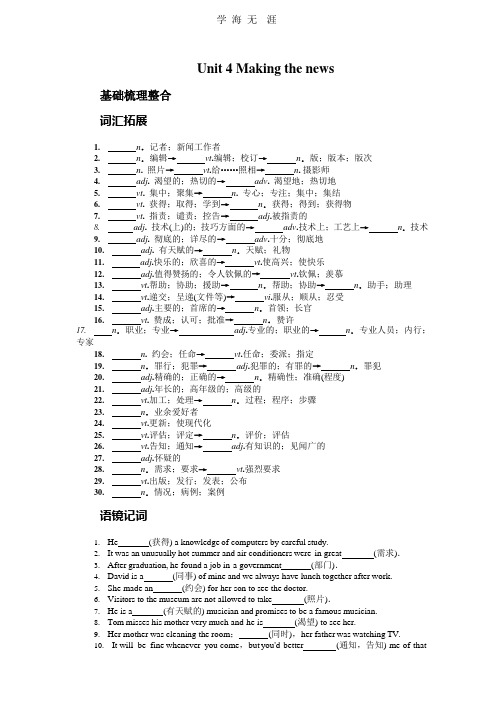

Unit 4 Making the news一.教学目 (Teaching aims)1.能力目 (Ability aim)Enable the Ss to recognize the variety of jobs there are in newspapers and whatis needed to work in a newspaper office.Enable the Ss to know what is needed to become a reporter and how to conduct aninterview.2..言目 (Language aim)重点和短occupation,update,submit,cover,concentrate on,inform,publish,polish, approve,acquire, accuse⋯of,so as to,scoop,deadline,depend on,ahead of, assess, demand, process重点句子Never will Zhou Yang forget his first assignment at the office of a popular English newspaper.You’ll find your colleagues very eager to assist you, so you may be able toconcentrate on photography later if you’re interested .Not only am I interested in photography, but I took an amateur course at universityto update my skills.Only if you ask many questions will you acquire all the information you need to know. We say a good journalist must have a good“nose” for a story.Meanwhile you have to prepare the next question depending on what the person says. Have you ever had a case where somebody accused your reporters of getting the wrong end of the stick?Perhaps I too will get a scoop!Aids: Multimedia facilities, tape-recorder, photos, diagrams二.教学重点 (Teaching important points)Know what is needed to become a reporter and how to conduct aninterview Master the use of inversion.三.教学方法 (Teaching method)Fast reading; Task-based method & discussion四.教学步 (Teaching procedure)Period 1Step I Warming up. ( see page 25 )Can you tell some jobs in a newspaper company? What are their jobs involves?Types of jobsWhat it involvesReporter/ journalistInterview people or finds out events from onlookersPhotographerTakes photos of important people or eventsEditorMakes sure the writing is clear, concise and accurate, check factsDesignerLays out the articles and photographsPrinterPrints the newspaperTeaching suggestions: rearrange the order of the types of jobs a newspaper has and what they involveAnd ask the students to do the matches. Then ask them to copy what’s on the screen to their books.At the same time deal with the new words:occupation and journalist and the expression: suppose you were⋯occupation =a job or professionTeaching is my occupation.教是我的 . 。

高中英语必修五第四单元精品教案设计一、教学内容1. Reading and Vocabulary:文章《Newspapers》的学习,分析新闻报纸的起源、发展及其在社会中的角色。
2. Grammar:复习和巩固现在完成时态,学习现在完成进行时态。
3. Listening and Speaking:听力练习,讨论新闻报道的准确性及其对社会的影响。
二、教学目标1. 让学生掌握文章《Newspapers》的主要内容和细节信息,了解新闻报纸的发展历程及其在社会中的作用。
2. 使学生能够熟练运用现在完成时态和现在完成进行时态描述过去发生并持续到现在的事件。
3. 培养学生的听力技巧,提高其口语表达能力,使其能够就新闻报道的准确性及其对社会的影响进行讨论。
三、教学难点与重点1. 教学难点:现在完成进行时态的用法,听力技巧的提高。
四、教具与学具准备1. 教具:多媒体设备、黑板、粉笔。
2. 学具:课本、练习册、听力材料、写作素材。
五、教学过程1. 导入:展示新闻报纸,引导学生讨论新闻在社会中的重要性,引入本节课的主题。
2. 阅读理解:学生阅读文章《Newspapers》,完成相应的练习题,教师对文章内容进行讲解和分析。
3. 语法讲解:通过例句,讲解现在完成时态和现在完成进行时态的用法,让学生进行随堂练习。
4. 听力练习:学生听新闻报道,完成听力练习,教师针对听力技巧进行讲解和指导。
5. 口语讨论:学生分组讨论新闻报道的准确性及其对社会的影响,教师给予指导和评价。
六、板书设计1. 文章《Newspapers》的主要内容和细节信息。
2. 现在完成时态和现在完成进行时态的用法。
3. 新闻评论的写作要点。
七、作业设计答案:学生完成的文章需包含新闻报道的主题、观点明确、论据充分、结构清晰。
八、课后反思及拓展延伸1. 教师反思:关注学生的学习效果,针对学生的掌握情况调整教学方法和节奏。
2. 拓展延伸:鼓励学生关注时事新闻,提高其英语素养,培养其独立思考和分析问题的能力。
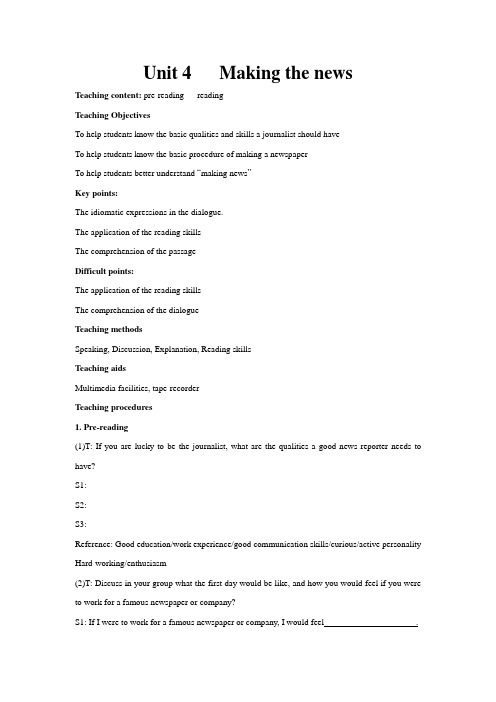
Unit 4 Making the newsTeaching content: pre-reading readingTeaching ObjectivesTo help students know the basic qualities and skills a journalist should haveTo help students know the basic procedure of making a newspaperTo help students better understand “making news”Key points:The idiomatic expressions in the dialogue.The application of the reading skillsThe comprehension of the passageDifficult points:The application of the reading skillsThe comprehension of the dialogueTeaching methodsSpeaking, Discussion, Explanation, Reading skillsTeaching aidsMultimedia facilities, tape-recorderTeaching procedures1. Pre-reading(1)T: If you are lucky to be the journalist, what are the qualities a good news reporter needs to have?S1:S2:S3:Reference: Good education/work experience/good communication skills/curious/active personality Hard-working/enthusiasm(2)T: Discuss in your group what the first day would be like, and how you would feel if you were to work for a famous newspaper or company?S1: If I were to work for a famous newspaper or company, I would feel .S2: If I were to work for a famous newspaper or company, I would feel . S3: If I were to work for a famous newspaper or company, I would feel .(3) Teach the idiomatic expressions in the dialoguecover a story 报道一个重要新闻trick of the trade 诀窍get the facts straight 公平地呈现事实get the wrong end of the stick 没有理解事实真相this is how the story goes 故事是这样的get a scoop 获得独家新闻2.While-reading⑴Listen to the tape while readingNow please listen to the recording of the text MY FIRST WORK ASSIGNMENT “Unforgettable,”says news reporter. Pay attention to the pronunciation of each word and the pauses within each sentence.⑵Fast readingSkimming:What does the reading passage mainly talk about? (AC)A. The qualities needed to become a good reporterB. The skills to become a professional photographerC. How to have a good interviewD. Being carefully in the new environmentScanning:The purpose of writing the passage1) It shows the students the skills necessary to become a good journalist.2).It wants to show how to conduct a good interview.What a new reporter should do on the first day?1) The first time he will be put as an assistant to and experienced journalist.2) There is no need for him to take a camera with him. He will have a professional photographer with him to take photographs.What a reporter needs to remember when going to cover a story1)He needs to be curious.2) A good reporter must have a “ nose ” for a story.3) He has to listen for detailed facts4) If the interviewee agrees, he can use a recorder to get the facts straight.⑶Careful readingTrue or False1) Zhou can go out on a story immediately. F2) Zhou took a notebook, a pen, a camera with himself. T3) While interviewing, the reporter would just ask the questions prepared before hand. F4) The footballer admitted he took the money. F5) Zhou took a course of photography at mid-school. F6)Zhou is very enthusiastic. T4. Post-readingSummaryTo the reporters, it’s (1) ____________for them to take a camera because they have (2)______________________ with them. The reporters should be (3)________ and they must have a (4) _____ for a story. They know how to (5) _______the information they need. While interviewing, they won’t (6) ,(7)_______ ____________________, (8)__________________________________. They will listen to the (9)_______ facts and ask new questions. There is a trick of the (10)____ __, that is ,with the permission of the interviewer, they would use (11) __________ which could keep the evidence to help (12) __________their story.1.unnecessary2. professional photographers3. curious4. nose5. acquire6. be rude7. they won’t talk too much themselves8. and they listen to the interviewee carefully9.detailed 10. trade11.recorders 12. supportHomework(1) Read aloud the dialogue with your partners. Pay attention to the stress and intonation.(2) Remember the idiomatic expressions.。

2013年高2014级期末考试必修5 Unit4复习学案一、单词拼写(须用本单元的单词和词汇)1. After graduation he took an o______________as a teacher in the city.2. The a______________offered by the manager is difficult for him to finish.3. An expert is a man who is engaged in p______________ business.4. All his c______________ who work with him in the same factory are all ready to help others.5. You should c_____________ on your work when you study.6. In the__________(案子)of Ma Haitao,he was treated unfairly.7. We also can a __________________knowledge during playing.8. He hit me on the head with a ball d_____________ which made me very angry.9. He felt g________________ after he stole some money from the old couple.10. His________________(简练)introduction of the product got great interest of the people.11. He worked as a e________________ in that newspaper.12. She graduated from English d__________________ of Beijing University.13. Don't just say almost,nearly…… ,what we need is a____________ number.14. My shoes are so dirty that they need to be P______________.15. I can't understand your meaning,can you give me a little h____________.16. Before marrying,they always made an a ___________ in that park.17. If I've hurt your feelings,it was quite without_______________(有意)。
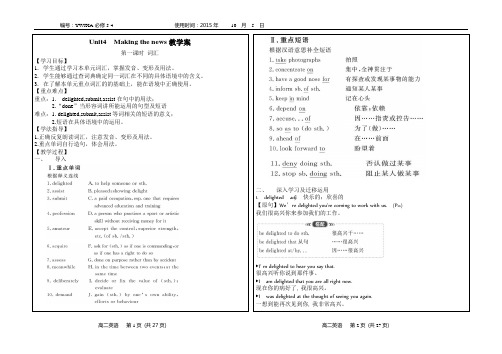
深入学习及迁移运用▶I’ m delighted to hear you say that.很高兴听你说到那件事。
▶I shall submit the report to the Chairman. 我将把报告交给主席。
▶We will submit ourselves to your arrangement. 我们会服从你们的安排的。
用submit的搭配完成句子▶Good glasses will assist you to read.好眼镜对你的阅读很有帮助。
▶He assisted me in painting the door.▶I need your assistance with this heavy load.我需要你帮我挑起这个重担。
▶The assistant who does assistant work very well usually assists Professor Wang with▶You should concentrate on the road when you’re driving.开汽车时你的注意力应集中在路上。
▶If you concentrate all your energies on the study of English,the language.你若全力以赴地学习英语, 你会掌握这门语言的。
用concentrate的正确形式填空①I tried to ____________ my attention on my English studies.▶It’s difficult to make an assess ment of the effects of these changes.这些改变的效果难以评价。
完成句子①After the flood, they ________________________________ 10 million洪水之后, 他们估算损失为一千万元。
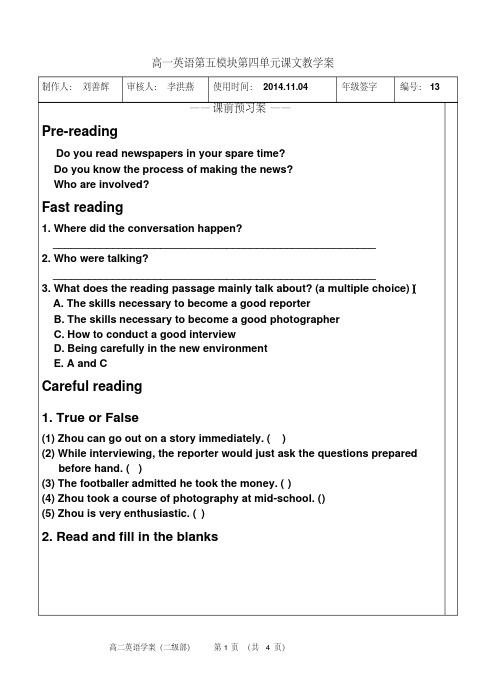
高一英语第五模块第四单元课文教学案制作人:刘善辉审核人:李洪燕使用时间:2014.11.04 年级签字编号:13——课前预习案——Pre-readingDo you read newspapers in your spare time?Do you know the process of making the news?Who are involved?Fast reading1.Where did the conversation happen?______________________________________________________2.Who were talking?______________________________________________________3. What does the reading passage mainly talk about? (a multiple choice) ( )A. The skills necessary to become a good reporterB. The skills necessary to become a good photographerC. How to conduct a good interviewD. Being carefully in the new environmentE. A and CCareful reading1. True or False(1) Zhou can go out on a story immediately. ( )(2) While interviewing, the reporter would just ask the questions preparedbefore hand. ( )(3) The footballer admitted he took the money. ( )(4) Zhou took a course of photography at mid-school. ( )(5) Zhou is very enthusiastic. ( )2. Read and fill in the blanks——课中探究案——一、检查反馈,导入新课。

Unit 5Theme parks基础梳理整合词汇拓展1.____________adj.中央的;中心的→____________ n.中心;中央;中心点2.____________adj.不同的;各种各样的→____________ n.种类;多样3.____________ n.幻想;怪念头→____________ n.想象力;幻想→____________ adj.极好的;美妙的;很棒的4.____________ n.消遣;娱乐(活动)→____________ vt.使人发笑;逗乐;使消遣;娱乐5.____________ n.秋千;摇摆→____________ vt.& vi.摇摆;摆动6.____________n.有吸引力的事物;吸引→____________vt.吸引;引起(注意、兴趣等)→____________ adj.迷人的;有吸引力的7.____________ n.旅游业→____________ n.旅行;观光;参观→____________ n.旅行者;观光者8.____________n.引擎;发动机→____________ n.工程师9.____________vt.保存;保留→____________ n.保护区10.____________n.长度;长→____________adj.长的11.____________ n.移民者;殖民者→____________ vi.& vt.安排;安放;安家;定居;解决12.____________ adj.运动的→____________n.田径运动员13.____________ n.译员;翻译→____________ vt.翻译→____________ n.翻译14.____________n.少数;少数民族→____________ n.多数;大半15.____________vt.& vi.前进;促进;提前→____________ n.前进;发展;改进;进步→____________adj.高级的;先进的16.____________n.外出;短途旅行;远足17.____________ n.允许进入;入场费;承认→____________ vt.让……进入;使获得(某种地位或特权); 接纳;承认(事实、错误等)18.____________n.高速公路语镜记词1.The girl sat on a swing,____________(摇摆)back and forth.2.Today many people are experiencing the joy of the ____________ (娱乐) park for the first time.3.Only a ____________(少数)of students receive the scholarship.4.There is a ____________(唯一的,独一无二的)opportunity to travel.5.In science fictions,aliens are ____________(生物)from the outer world.6.The society was set up to ____________(保护)endangered species from extinction.7.She failed to gain ____________(进入)to the university of her choice.8.She took the job for ____________(各种各样的)reasons.9.Buckingham Palace is a major tourist ____________(景点).10.It's cheaper if you book the tickets in ____________(预先).短语回顾1.be famous ____________ 以……闻名2.____________ wonder 难怪;不足为奇3.be modelled ____________根据……模仿;仿造4.____________ advance 提前5.get close ____________接近6.e ____________ life 活跃起来;苏醒过来典句背诵1.With all these attractions, ____________ ____________ tourism is increasing wherever there is a Disneyland.有这么多引人入胜的东西,难怪哪里有迪斯尼乐园,哪里的旅游业就会发展。
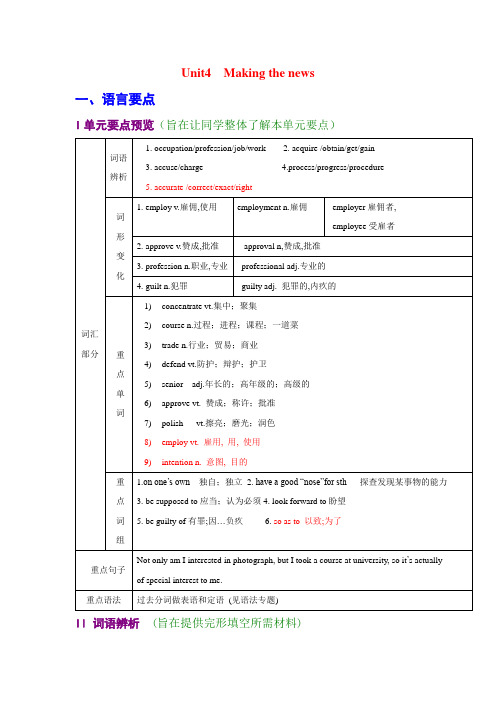
Unit4 Making the news 一、语言要点I单元要点预览(旨在让同学整体了解本单元要点)II 词语辨析(旨在提供完形填空所需材料)III 词性变化(旨在提供语法填空所需材料)IV 重点词汇(旨在提供综合运用所需材料)1)concentrate vt.集中;聚集[典例]1)Authority was concentrated in the president. 政权集于总统一身2)We concentrated on the task before us. 我们专注于眼前的任务[重要用法]concentration n. 集中,专心with deep concentration专心concentrate one's attention on [upon] 把注意力集中在[练习]汉译英1) 如果你全神贯注,就能解决这个问题。
_______________________________________________________________________________ ___________2) 面对巨大的灾难,整个社会致力于解救废墟中的人们。
_______________________________________________________________________________Key: 1)You’ll solve the problem if you concentrate upon it. 2) Facing the great disaster, the whole society concentrated its attention on rescuing the people in ruin.2)course n.过程;进程;课程;一道菜[典例]a course of medical treatments. 医学治疗的一个疗程a short -term course短期班a dinner of five courses有五菜的正餐[练习] 汉译英---在上课期间必须关闭手机吗?---当然。
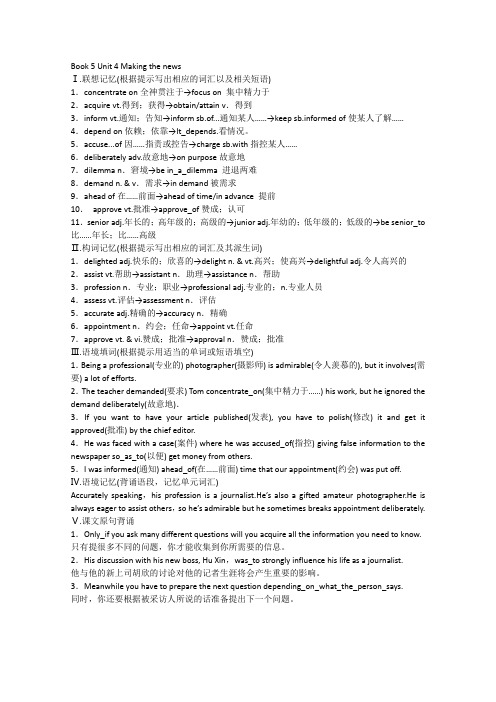
Book 5 Unit 4 Making the newsⅠ.联想记忆(根据提示写出相应的词汇以及相关短语)1.concentrate on全神贯注于→focus on 集中精力于2.acquire vt.得到;获得→obtain/attain v.得到3.inform vt.通知;告知→inform sb.of...通知某人……→keep rmed of使某人了解……4.depend on依赖;依靠→It_depends.看情况。
5.accuse...of因……指责或控告→cha rge sb.with指控某人……6.deliberately adv.故意地→on purpose故意地7.dilemma n.窘境→be in_a_dilemma 进退两难8.demand n. & v.需求→in demand被需求9.ahead of在……前面→ahead of time/in advance 提前10.approve vt.批准→approve_of赞成;认可11.senior adj.年长的;高年级的;高级的→junior adj.年幼的;低年级的;低级的→be s enior_to 比……年长;比……高级Ⅱ.构词记忆(根据提示写出相应的词汇及其派生词)1.delighted adj.快乐的;欣喜的→delight n. & vt.高兴;使高兴→delightful adj.令人高兴的2.assist vt.帮助→assistant n.助理→assistance n.帮助3.profession n.专业;职业→professional adj.专业的;n.专业人员4.assess vt.评估→assessment n.评估5.accurate adj.精确的→accuracy n.精确6.appointment n.约会;任命→appoint vt.任命7.approve vt. & vi.赞成;批准→approval n.赞成;批准Ⅲ.语境填词(根据提示用适当的单词或短语填空)1.Being a professional(专业的) photographer(摄影师) is admirable(令人羡慕的), but it involves(需要) a lot of efforts.2.The teacher demanded(要求) Tom concentrate_on(集中精力于……) his work, but he ignored the demand deliberately(故意地).3.If you want to have your article published(发表), you have to polish(修改) it and get it approved(批准) by the chief editor.4.He was faced with a case(案件) where he was accused_of(指控) giving false information to the newspaper so_as_to(以便) get money from others.5.I was informed(通知) ahead_of(在……前面) time that our appointment(约会) was put off. Ⅳ.语境记忆(背诵语段,记忆单元词汇)Accurately speaking,his profession is a journalist.He’s also a gifted amateur photographer.He is always eager to assist others,so he’s admirable but he sometimes breaks appointment deliberately.Ⅴ.课文原句背诵1.Only_if you ask many different questions will you acquire all the information you need to know. 只有提很多不同的问题,你才能收集到你所需要的信息。

高中英语真题:学2014届高考英语一轮复习Unit5Themeparks学案新人教版必修4【课标要求】Unit 5 Theme parks 高考知识点【复习任务】1学习重点attraction, preserve, advance, various, admission, amusement ,unique 等2学习难点advance ,various ,wonder 等【问题导学】I.请根据语义及提示写出单1. The idea of traveling to the moon holds little __________(吸引力) for me.2. I think these interesting old customs should be __________(保留下来).3. He has been elected an ________(先进的) teacher because of his achievements in teaching.4. Nowadays everybody should read the newspaper because it supplies us with a __________ (various)of news every day.5. Without teachers' a__________, the students cannot enter the language laboratory.6. The brand-new style of teaching is a continuous source of __________ (amuse) and delight to us.7. The book's t__________is the conflict between love and duty.8. The issues being discussed here are not __________(独有的)to the USA.9. Young children sometimes can't distinguish between f______ ____ and reality.10.W __________ and whatever you like,there is a theme park for you!II.请根据语义写出短语1.______________各种各样的2.__________ 以……而闻名3. __________不仅仅4.__________ 难怪;不足为奇5. __________ 根据……模仿;仿造6. __________ 提前7. __________ 接近8. __________ 活跃起来III.考点单词、短语、句型advance vi. vt. ______ _______ n.________ ______ ______advanced adj.______________课文原句________________________________________________翻译 (1) The class are advancing towards the foot of the hill.(2) The group's research has done much to advance our knowl edge of the HIV virus.(3) Many thanks, in advance, for your help.(4) It is one of the great technological advances of the 20th cen tury.(5)The date of the meeting was advanced.用法总结________________________________________________________ _______________2. admission n. ______ _______ _____admit v. (admitted, admitted) _______ ______ ______课文原句________________________________________________翻译(1) Admission to Beijing University depends on examination res ults.(2) Admission to the theme park costs 30 dollars.(3) He has made the mistake by his own admission.(4)Nowadays, more and more students are admitted to key univ ersities every year.用法总结________________________________________________________ _______________Preserve课文原句________________________________________________ We will do everything to preserve peace.What can we do to preserve the company from ruin?We preserve fish in salt.No hunting is allowed in the preserve.用法总结________________________________________________________ _______________Charge课文原句________________________________________________ The police charged the man with stealing the money.He charged me 1.5 yuan for mending the watch.He forgot to charge the battery.用法总结________________________________________________________ _______________Profit课文原句________________________________________________ There is very little profit in selling newspapers at present.We hope to sell the goods at a profit.We profit from the work of the specialist.All his wealth did not profit him.用法总结_______________________________________________________________________7.wonder vi. &vt._____________ n. 惊奇;惊叹(不可数);奇迹;奇观;奇事(可数)课文原句________________________________________________ wonderful adj. ______________wonderfully adv. _____________ _wonder + that-clause 对……感到惊讶wonder + wh-clause 想知道……;不知道……;对……感到纳闷wonder if sb. can do sth. (一种委婉的请求)(It's) no / small/ little wonder (that) 难怪;怪不得;……不足为奇It's a wonder that…令人惊奇的是……;奇怪的是……do/work wonders 创造奇迹;取得惊人的成效He is always working hard. No wonder he has passed the entra nce exams.( )(1) I wonder ______ he is a teacher.A. thatB. whoC. whatD. if( )(2) — Was he sorry for what he'd done? — ______.A. No wonderB. Well doneC. Not reallyD. Go ahea d8.model v._____________ n.________________课文原句________________________________________________ The model shows the whole project of the irrigation system. His mother is a model of industry.It took him a whole day to finish making a model plane.She models in clay.She models herself on her mother.用法总结________________________________________________________ _______________e to life________________________翻译 (1) I love to watch everything come to life in spring.(2) In a few minutes Tom suddenly came to life.(3) The quiet girl has come to life since she worked as a sale swoman.bring…to life _______________ come back to life _________ come to sth. _______________ came to one' s help _______ come to sb. (that…)/occur to sb.(指看法)被某人想出come to sb. (from sb.)(指钱、财产等)作为遗产送给或留给某人 Come to light 显露出来 come to the point谈正题(1) You're very cool with your brother, but with your friends you really ______ (很活跃).(2) Everybody thought he was drowned but he ______ (苏醒过来).(3) It suddenly______ (她突然想到) that she had been wrong all along.(4) The farm ______(留给他) on his father' s death.(5) She __________(她来帮助我们了).Much new evidence has _________________(被发现).His lectures are interesting but he never seems to ___________ ____(谈到正题).【问题反馈】学2014届高考英语一轮复习Unit5Themeparks学案新人教版必修4【课标要求】Unit 5 Theme parks 高考知识点【复习任务】1学习重点attraction, preserve, advance, various, admission, amusement,unique 等2学习难点advance ,various ,wonder 等【问题导学】I.请根据语义及提示写出单1. The idea of traveling to the moon holds little __________(吸引力) for me.2. I think these interesting old customs should be __________(保留下来).3. He has been elected an ________(先进的) teacher because of his achievements in teaching.4. Nowadays everybody should read the newspaper because it supplies us with a __________ ( various)of news every day.5. Without teachers' a__________, the students cannot enter the language laboratory.6. The brand-new style of teaching is a continuous source of __________(amuse) and delight to us.7. The book's t__________is the conflict between love and duty.8. The issues being discussed here are not __________(独有的)to the USA.9. Young children sometimes can't distinguish between f__________ and reality.10.W __________ and whatever you like,there is a theme park for you!II.请根据语义写出短语1.______________各种各样的2.__________ 以……而闻名5. __________ 根据……模仿;仿造6. __________ 提前7. __________ 接近8. __________ 活跃起来III.考点单词、短语、句型advance vi. vt. ______ _______ n.________ ______ ______advanced adj.______________课文原句________________________________________________翻译 (1) The class are advancing towards the foot of the hill.(2) The group's research has done much to advance our knowledge of the HIV virus.(3) Many thanks, in advance, for your help.(4) It is one of the great technological advances of the 20th century.(5)The date of the meeting was advanced.用法总结_______________________________________________________________________2. admission n. ______ _______ _____admit v. (admitted, admitted) _______ ______ ______课文原句________________________________________________翻译(1) Admission to Beijing University depends on examination results.(2) Admission to the theme park costs 30 dollars.(3) He has made the mistake by his own admission.(4)Nowadays, more and more students are admitted to key universities every year.用法总结_______________________________________________________________________Preserve 课文原句________________________________________________What can we do to preserve the company from ruin?We preserve fish in salt.No hunting is allowed in the preserve.用法总结_______________________________________________________________________ Charge课文原句________________________________________________The police charged the man with stealing the money.He charged me 1.5 yuan for mending the watch.He forgot to charge the battery.用法总结_______________________________________________________________________ Profit课文原句________________________________________________There is very little profit in selling newspapers at present.We hope to sell the goods at a profit.We profit from the work of the specialist.All his wealth did not profit him.用法总结_______________________________________________________________________ 7.wonder vi. &vt._____________ n. 惊奇;惊叹(不可数);奇迹;奇观;奇事(可数)课文原句________________________________________________wonderful adj. ______________wonderfully adv. ______________wonder + that-clause 对……感到惊讶wonder + wh-clause 想知道……;不知道……;对……感到纳闷wonder if sb. can do sth. (一种委婉的请求)(It's) no / small/ little wonder (that) 难怪;怪不得;……不足为奇It's a wonder that…令人惊奇的是……;奇怪的是……do/work wonders 创造奇迹;取得惊人的成效He is always working hard. No wonder he has passed the entrance exams.( )(1) I wonder ______ he is a teacher.( )(2) — Was he sorry for what he'd done? — ______.A. No wonderB. Well doneC. Not reallyD. Go ahead8.model v._____________ n.________________课文原句________________________________________________The model shows the whole project of the irrigation system.His mother is a model of industry.It took him a whole day to finish making a model plane.She models in clay.She models herself on her mother.用法总结_______________________________________________________________________ e to life________________________翻译 (1) I love to watch everything come to life in spring.(2) In a few minutes Tom suddenly came to life.(3) The quiet girl has come to life since she worked as a saleswoman.bring…to life _______________ come back to life _________come to sth. _______________ came to one' s help _______come to sb. (that…)/occur to sb.(指看法)被某人想出come to sb. (from sb.)(指钱、财产等)作为遗产送给或留给某人Come to light 显露出来 come to the point谈正题(1) You're very cool with your brother, but with your friends you really ______ (很活跃).(2) Everybody thought he was drowned but he ______ (苏醒过来).(3) It suddenly______ (她突然想到) that she had been wrong all along.(4) The farm ______(留给他) on his father' s death.(5) She __________(她来帮助我们了).Much new evidence has _________________(被发现).His lectures are interesting but he never seems to _______________(谈到正题).【问题反馈】。
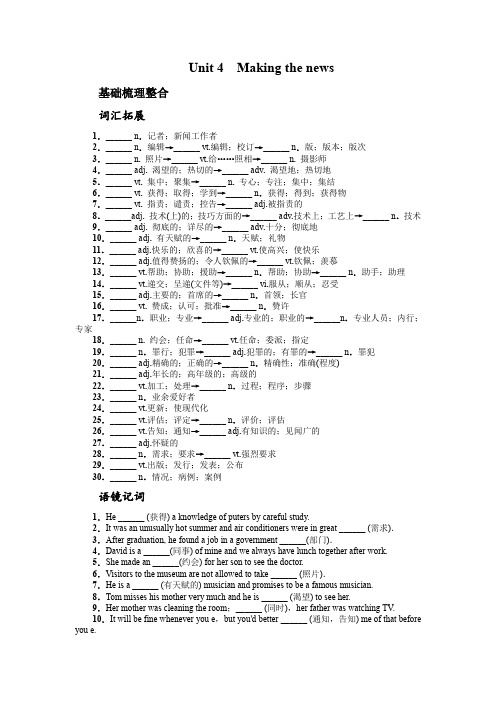
Unit 4Making the news基础梳理整合词汇拓展1.______n.记者;新闻工作者2.______n.编辑→______vt.编辑;校订→______n.版;版本;版次3.______n. 照片→______vt.给……照相→______n. 摄影师4.______adj. 渴望的;热切的→______ adv. 渴望地;热切地5.______ vt. 集中;聚集→______n. 专心;专注;集中;集结6.______vt. 获得;取得;学到→______n.获得;得到;获得物7.______vt. 指责;谴责;控告→______adj.被指责的8.______adj. 技术(上)的;技巧方面的→______adv.技术上;工艺上→______n.技术9.______adj. 彻底的;详尽的→______adv.十分;彻底地10.______adj. 有天赋的→______n.天赋;礼物11.______adj.快乐的;欣喜的→______vt.使高兴;使快乐12.______adj.值得赞扬的;令人钦佩的→______vt.钦佩;羡慕13.______vt.帮助;协助;援助→______n.帮助;协助→______n.助手;助理14.______vt.递交;呈递(文件等)→______vi.服从;顺从;忍受15.______adj.主要的;首席的→______n.首领;长官16.______vt. 赞成;认可;批准→______n.赞许17.______n.职业;专业→______adj.专业的;职业的→______n.专业人员;内行;专家18.______n. 约会;任命→______vt.任命;委派;指定19.______n.罪行;犯罪→______adj.犯罪的;有罪的→______n.罪犯20.______adj.精确的;正确的→______n.精确性;准确(程度)21.______adj.年长的;高年级的;高级的22.______vt.加工;处理→______n.过程;程序;步骤23.______n.业余爱好者24.______vt.更新;使现代化25.______vt.评估;评定→______n.评价;评估26.______vt.告知;通知→______adj.有知识的;见闻广的27.______adj.怀疑的28.______n.需求;要求→______vt.强烈要求29.______vt.出版;发行;发表;公布30.______n.情况;病例;案例语镜记词1.He ______ (获得) a knowledge of puters by careful study.2.It was an unusually hot summer and air conditioners were in great ______ (需求).3.After graduation, he found a job in a government ______(部门).4.David is a ______(同事) of mine and we always have lunch together after work.5.She made an ______(约会) for her son to see the doctor.6.Visitors to the museum are not allowed to take ______ (照片).7.He is a ______ (有天赋的) musician and promises to be a famous musician.8.Tom misses his mother very much and he is ______ (渴望) to see her.9.Her mother was cleaning the room;______ (同时),her father was watching TV.10.It will be fine whenever you e,but you'd better ______ (通知,告知) me of that before you e.短语回顾1.concentrate ______ 集中;全神贯注于2.accuse ...______ ...因……指责或控告……3.so as ______ (do sth.) 为了(做)……4.ahead ______ 在……前面5.depend ______依靠;依赖典句背诵1.____________Zhou Yang (ZY) forget his first assignment at the office of a popular English newspaper.周阳将永远不会忘记他在一家非常有名的英语报社的第一次任务。

Unit 4Making the news基础梳理整合词汇拓展1.______n.记者;新闻工作者2.______n.编辑→______vt.编辑;校订→______n.版;版本;版次3.______n. 照片→______vt.给……照相→______n. 摄影师4.______adj. 渴望的;热切的→______ adv. 渴望地;热切地5.______ vt. 集中;聚集→______n. 专心;专注;集中;集结6.______vt. 获得;取得;学到→______n.获得;得到;获得物7.______vt. 指责;谴责;控告→______adj.被指责的8.______adj. 技术(上)的;技巧方面的→______adv.技术上;工艺上→______n.技术9.______adj. 彻底的;详尽的→______adv.十分;彻底地10.______adj. 有天赋的→______n.天赋;礼物11.______adj.快乐的;欣喜的→______vt.使高兴;使快乐12.______adj.值得赞扬的;令人钦佩的→______vt.钦佩;羡慕13.______vt.帮助;协助;援助→______n.帮助;协助→______n.助手;助理14.______vt.递交;呈递(文件等)→______vi.服从;顺从;忍受15.______adj.主要的;首席的→______n.首领;长官16.______vt. 赞成;认可;批准→______n.赞许17.______n.职业;专业→______adj.专业的;职业的→______n.专业人员;内行;专家18.______n. 约会;任命→______vt.任命;委派;指定19.______n.罪行;犯罪→______adj.犯罪的;有罪的→______n.罪犯20.______adj.精确的;正确的→______n.精确性;准确(程度)21.______adj.年长的;高年级的;高级的22.______vt.加工;处理→______n.过程;程序;步骤23.______n.业余爱好者24.______vt.更新;使现代化25.______vt.评估;评定→______n.评价;评估26.______vt.告知;通知→______adj.有知识的;见闻广的27.______adj.怀疑的28.______n.需求;要求→______vt.强烈要求29.______vt.出版;发行;发表;公布30.______n.情况;病例;案例语镜记词1.He ______ (获得) a knowledge of puters by careful study.2.It was an unusually hot summer and air conditioners were in great ______ (需求).3.After graduation, he found a job in a government ______(部门).4.David is a ______(同事) of mine and we always have lunch together after work.5.She made an ______(约会) for her son to see the doctor.6.Visitors to the museum are not allowed to take ______ (照片).7.He is a ______ (有天赋的) musician and promises to be a famous musician.8.Tom misses his mother very much and he is ______ (渴望) to see her.9.Her mother was cleaning the room;______ (同时),her father was watching TV.10.It will be fine whenever you e,but you'd better ______ (通知,告知) me of that before you e.短语回顾1.concentrate ______ 集中;全神贯注于2.accuse ...______ ...因……指责或控告……3.so as ______ (do sth.) 为了(做)……4.ahead ______ 在……前面5.depend ______依靠;依赖典句背诵1.____________Zhou Yang (ZY) forget his first assignment at the office of a popular English newspaper.周阳将永远不会忘记他在一家非常有名的英语报社的第一次任务。
句型提炼:表示否定意义的副词位于句首,句子要用部分倒装的形式。
2.His discussion with his new boss, Hu Xin(HX), ______ ______ ______ ______ his life as a journalist.他与他的新老板胡新的讨论对他的记者生涯必将产生强烈的影响。
句型提炼:be to do sth.“注定要……,必将会……”,表示将来的情况。
归纳拓展1.accuse vt.指责;谴责;控告accuse sb.of doing sth.因(做)某事指责/控告某人be accused of (doing) sth.因(做)某事受到指责/控告①He was accused of theft.他因偷窃被指控。
②I don't think anyone can accuse him of not being frank.我想谁也不能说他不坦率。
易混辨析accuse与charge两者都有“控诉,指控”之意,但它们后面所搭配的介词不同。
accuse vt.“指控,控诉”,与介词of连用。
charge vt.可以指因为小错而受到责备,也可指因违法而受到控告,与介词with连用。
①Are you accusing me of lying?你是在指责我撒谎吗?②The police charged him with murder.警察指控他犯了谋杀罪。
反馈1.1The court ______ him with carrying dangerous articles.A.accused B.charged C.attacked D.scolded反馈1.2The shop assistant was dismissed as she was ______ of cheating customers.A.accused B.charged C.scolded D.cursed2.approve vi.赞成;同意vt.批准;通过(1)approve of sb./sth.赞成;同意approve of sb.'s doing sth.同意某人干某事(2)approve sth.批准某事①She thought for a moment and then approved.她想了一会儿,然后就同意了。
②Could I ask if you approve of the project?我能问一下你是否赞成这个项目吗?③The minister approved the building plan.部长批准了该建筑计划。
用法拓展approval n.同意;批准give one's approval to批准with approval of ...经……的批准①She wanted to win her father's approval.她想征得她父亲的赞同。
②The road schemes have been given approval.筑路计划已被批准。
反馈 2.1It seems that most educators ______ the plan for Advanced Assessment for Admission, which gives rise to a plete reform of College Entrance Exams.A.consist of B.plain of C.approve of D.dream of反馈2.2Her father will never ______ her marrying to the old man with lots of money.A.approve of B.admit C.agree to D.allow3.case n.情况;病例;案例in any case无论如何;不管怎样(just) in case以防(万一)in case of ...万一……;如果发生……in no case决不(置于句首,引起倒装)in that case如果那样的话;在那种情况下as is often the case情况常常如此①The lawyer is confident in winning the case.律师有把握胜诉。
②In any case,do your best.无论如何,要尽力而为。
③In case of fire, please break the glass.如果发生火灾,请砸碎玻璃。
④In no case should you give up.你决不能放弃。
⑤Keep the windows closed in case it rains.关着窗户,以防下雨。
反馈3.1Insurance should be paid______disability.A.instead of B.in favour of C.in spite of D.in case of反馈3.2Today,we'll discuss a number of cases ______ beginners of English fail to use the language properly.A.which B.as C.why D.where4.concentrate vt. & vi.专心于;注意;集中;聚集concentrate on sth./doing sth.专心致志于某事/做某事concentrate one's attention on sth.致力于某事;把注意力集中在某事上①We must concentrate our efforts on improving education.我们必须致力于改进教育工作。